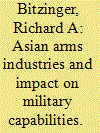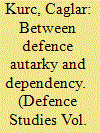|
|
|
Sort Order |
|
|
|
Items / Page
|
|
|
|
|
|
|
| Srl | Item |
| 1 |
ID:
153714


|
|
|
|
|
| Summary/Abstract |
Asia is a leading consumer of arms, and some of the most modern and most advanced armaments are finding their way into the inventories of Asian militaries. As a result, many Asian-Pacific militaries have experienced a significant, if not unprecedented, build-up over past several years, both in terms of quantity and quality. In addition to this trend, however, Asia has become an increasingly significant producer of armaments. Many nations in the region, if they can, have sought to supplant, or at least supplement, foreign arms suppliers with indigenous producers of needed weapons systems. However, for most Asian-Pacific militaries (the possible exception being China) indigenously produced weapons add only partial value to military capabilities. Consequently, imports of advanced weaponry remain a critical dependency for most of Asian-Pacific nations.
|
|
|
|
|
|
|
|
|
|
|
|
|
|
|
|
| 2 |
ID:
153711


|
|
|
|
|
| Summary/Abstract |
Turkish defence industries have significantly improved their production capabilities since the 1980s. According to the official documents, Turkey reached 54% local production level in 2011. Encouraged by this impressive defence industrial development, the government of Turkey declared that defence industrial autarky, the country’s main goal since the 1980s, would be reached by 2023. This paper evaluates the possibility of Turkey’s defence autarky. Contrary to the existing approaches in the literature that assess technological capabilities and cost-effectiveness, this paper argues that Turkey’s search for defence autarky is hindered by the interplay of institutional deficiencies, dependency on foreign inputs, and the United States’ continuing influence over Turkish politics.
|
|
|
|
|
|
|
|
|
|
|
|
|
|
|
|
| 3 |
ID:
105083


|
|
|
|
|
| Publication |
2011.
|
| Summary/Abstract |
This paper examines defense industrialization in three leading arms-producing states in Asia - India, Japan, and South Korea - and how their experiences compare to China's recent defense industrial developments. It argues that despite decades of considerable effort and investments in pursuit of a techno-nationalist self-arming strategy, these countries have experienced only modest success when it comes to achieving such self-reliance. Most regional defense industrial bases lack the necessary design skills and technological expertise in order to truly innovate, and at best these countries act as 'late innovators' when it comes to armaments production.
The experiences of these countries have lessons for China as it attempts to move into the first tier of arms-producing states. China has over the past 15 years made significant progress in modernizing its defense technological and industrial base. At the same time, China faces the same long-term challenges that currently confront other regional arms industries - that is, making techno-nationalism work at the later stages of innovation. This is particularly critical as China's defense industry strives to move from a basically platform-centric to an increasingly network-centric technological-industrial process.
|
|
|
|
|
|
|
|
|
|
|
|
|
|
|
|
| 4 |
ID:
170248


|
|
|
|
|
| Summary/Abstract |
When it comes to states arming themselves, it has become axiomatic among scholars of comparative defence industries that go-it-alone production is no longer an option for most. The processes associated with defence-industrial globalization combined with the ever-rising costs of producing leading-edge weapons systems present huge disincentives for autarky in armaments. Against these strong headwinds, however, India has recently launched, as part of a broader, multi-sector initiative called Make in India, a renewed effort to achieve greater self-reliance in armaments production. This article first places India’s recent defence indigenization efforts within wider discussions about states’ armament strategies and trends in global arms production. Secondly, it contextualizes the drivers behind New Delhi’s latest attempts to transform itself from leading arms importer to major producer (and significant exporter) against the backdrop of past efforts which have yielded little but disappointment. Third, it explicates the main facets of the current strategy for defence-industrial indigenization and gauges its chances for success. To preview the main findings, we argue that self-reliance in armaments via indigenous production will almost certainly continue to allude India because of systemic, structural and technological constraints.
|
|
|
|
|
|
|
|
|
|
|
|
|
|
|
|
| 5 |
ID:
191218


|
|
|
|
|
| Summary/Abstract |
This paper demonstrates how preferences for energy trading are influenced by autarky aspirations and possible financial benefits from energy trading in the form of lower energy expenses and additional income. It presents findings from a survey on preferences for energy trading on a community-based platform within a residential estate setting. The survey included a choice experiment of hypothetical home choices with the possibility of energy trading on a peer-to-peer (P2P) energy trading platform. It also distinguished between preferences for buying and selling. Participants were 649 residents of housing estates in Ibadan, a Nigerian city. According to our logistic regression analysis, willingness to participate in energy trading was influenced by autarky aspirations and financial benefits. The financial benefits that interest respondents include gaining additional income from P2P energy trading and reducing overall power expenses. The autarky benefit that drives interest in P2P is “reduced reliance” on the grid for electricity. Real estate developers could therefore capitalise on consumers' high levels of interest in the benefits of homes with P2P energy trading capabilities. Nigerian energy policymakers should put in place structures that support P2P because P2P energy trading can unlock the additional value of solar PV for residential consumers.
|
|
|
|
|
|
|
|
|
|
|
|
|
|
|
|
| 6 |
ID:
149427


|
|
|
|
|
| Summary/Abstract |
In examining the Turkish response to the crisis of the 1930s, this paper contributes to existing literature at three levels: economic policy conception, comparative case selection, and mode of explanation. First, it takes a holistic approach to economic policy (neomercantilism) by looking at its foreign trade and finance (autarkic), microeconomic (etatist), and macroeconomic (neoclassical orthodox) dimensions. Second, it locates the Turkish response in the Balkan context, where other small states responded to comparable stimuli. Third, while viewing the macroeconomic conservatism of Turkish neomercantilism as a situational necessity, it explains the autarkic dimension by the shared German metropolitan linkages of the Balkans as a region, and the etatist dimension by the Kemalist bureaucracy’s larger room for maneuver in a context of wider gap between political modernization and economic backwardness.
|
|
|
|
|
|
|
|
|
|
|
|
|
|
|
|
| 7 |
ID:
166519


|
|
|
|
|
| Summary/Abstract |
Battery storage systems can balance the intermittency of renewable energy sources. Lithium-ion systems exhibit a declining price trajectory alongside a growing demand. However, little is known about consumer preferences and appropriate business models for storage systems. This paper presents an analysis of German adopters of a photovoltaic system (n = 752) and interested non-adopters (n = 84) to investigate their preferences for lithium-ion storage systems. In a choice experiment respondents had to choose among different system configurations. Respondents preferred choosing none of the presented systems over choosing a system. Potential for the residential and community storage concept with joint usage is found. High levels of autarky have a high utility. Consumers favor ownership over use rights and are willing to give up control to provide services for the grid. Market opportunities for cooperatives, regional power providers, and new market entrants exist. The study can assist in creating customer-focused business models and implementing multi-purpose use cases with value for different actors in the energy system.
|
|
|
|
|
|
|
|
|
|
|
|
|
|
|
|
| 8 |
ID:
166339


|
|
|
|
|
| Summary/Abstract |
This article reconstructs the transformation of the Greek energy system during the past hundred years, with a special focus on the dynamics of the country's foreign energy dependencies. The years after World War II saw the rise of domestic lignite and, to a lesser extent, hydropower as the most important energy sources in the country's electrical system, while at the same time the state took a firm grip of energy sector through the establishment of the Public Electricity Company (PPC). We reconstruct how state actors as well as corporate stakeholders organized policies and legitimized energy technologies in search of energy autarky and security while at the same time the energy system – especially in oil and gas – became strongly dependent on imports. Later on natural gas was introduced, being imported mainly from the USSR and Algeria, for substituting highly polluting (imported) oil- and (domestic) lignite-based electricity plants. In recent years gas has offered a new opportunity for Greece to establish itself as a hub in a wider international transmission system. The paper argues that Greek actors defined and redefined energy sources and technologies in relation to political priorities, regimes of competition and broader societal pressures in a way that had a deep impact on Greece's energy import dependence.
|
|
|
|
|
|
|
|
|
|
|
|
|
|
|
|
|
|
|
|
|